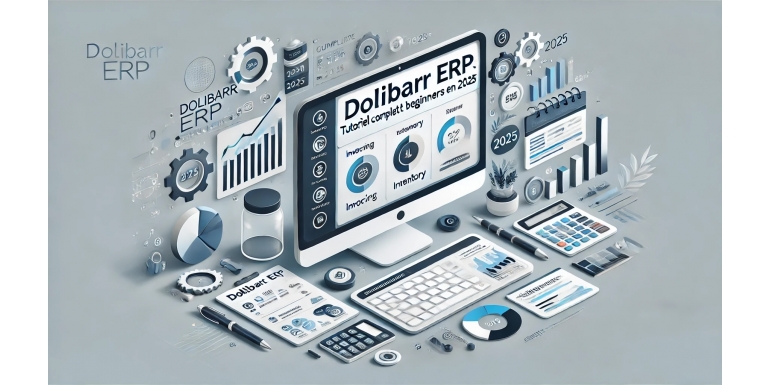
Managing a small or medium-sized business (SMB) can be overwhelming, especially when handling various aspects like inventory, customer relationships, sales, and finances. That's where ERP (Enterprise Resource Planning) software comes into play. ERP systems offer comprehensive solutions to streamline business operations, save time, and enhance growth. Dolibarr, a well-known open-source ERP, has become a go-to tool for businesses seeking accessibility, simplicity, and customizability.
If you're new to Dolibarr, this step-by-step guide will help you understand its features and functionalities, and how to integrate it into your business operations effectively.
What is Dolibarr? An Introduction to the ERP
History and Development of Dolibarr
Dolibarr was first created in 2003 as an open-source platform to make enterprise resource planning accessible to small businesses, freelancers, and non-profit organizations. Developed by a community of dedicated developers, Dolibarr continuously evolves to meet modern business needs. Regular updates ensure that the platform aligns with market trends while staying user-friendly and cost-effective—a key point compared to its competitors.
Key Features of Dolibarr
Dolibarr provides modules to cover every aspect of business management. Here are some of its most popular features:
- Customer Relationship Management (CRM): Manage leads, contacts, and customer relationships efficiently.
- Inventory Management: Track stock levels and manage supply chain activities effortlessly.
- Billing and Finances: Automate invoicing, payment tracking, and financial reporting.
- Project Management: Organize tasks, deadlines, and team efforts in one place.
- Customization Options: Add or remove modules to tailor the software to your specific needs.
- Ease of Access: Since it’s web-based, you can access Dolibarr from any device with an internet connection.
Who is Dolibarr Best Suited For?
Dolibarr is designed with flexibility in mind, making it suitable for:
- Startups looking for cost-effective solutions.
- Freelancers who want an all-in-one platform.
- Small to medium-sized companies managing complex business operations.
- Non-profits needing tools for fundraising and member management.
Setting Up Dolibarr for Your Business
If you're ready to try Dolibarr, follow these initial steps:
- Install the Software: Download Dolibarr from its official website and set it up on your server. An alternative solution is to opt for a cloud-based hosting service.
- Configure Core Modules: Choose relevant modules, such as CRM, invoicing, or inventory, based on your business needs.
- Add Users: Assign roles to employees and grant them appropriate access levels.
- Start Using It: Begin inputting your company data and customizing settings to fit your workflow.
How Dolibarr Compares to Odoo
Although Dolibarr is remarkable, Odoo is another popular ERP solution deserving of mention. Which one is the right fit for your business? Let's dig deeper into the comparison.
Pricing Models
- Dolibarr: Being open-source, Dolibarr allows free installation, with optional paid add-ons or services for more advanced needs. It's a budget-friendly option.
- Odoo: Odoo offers two main versions—the Community version (free) and the Enterprise version (paid). The Enterprise version may be costly for SMBs but includes additional features.
Ease of Use
- Dolibarr: Renowned for its straightforward interface. You don’t have to be a tech expert to set it up and use it efficiently.
- Odoo: Odoo's UI is dynamic and modern. However, the learning curve can be steeper compared to Dolibarr, especially for first-time users.
Customization and Scalability
- Dolibarr: Offers modular customizations, making it versatile yet manageable.
- Odoo: While offering advanced customization options, Odoo might require external assistance for complex needs.
Integration with Other Tools
- Dolibarr: You can integrate Dolibarr with third-party tools like PayPal, Stripe, and Google Calendar. While options are available, the range is not as extensive as Odoo's.
- Odoo: Known for its seamless integrations, Odoo offers a wide variety of third-party plugins and extensions.
Community Support
- Dolibarr: Backed by an active global community offering free support through forums, tutorials, and documentation.
- Odoo: Similarly, Odoo has a robust community—particularly strong for its open-source Community version.
Real-Life Success with Dolibarr
Case Study 1: A Small Retail Business
A family-owned retail store implemented Dolibarr to manage inventory and invoicing. Within three months, the business reported a 40% reduction in paperwork and faster stock turnover.
Case Study 2: A Freelance Graphic Designer
By using Dolibarr’s integrated CRM, a freelance designer tracked client communications and project timelines without jumping between different tools. This improved customer satisfaction ratings significantly.
Testimonial
"Dolibarr changed how we run our operations. Its simplicity makes it perfect for our small team, and its modularity allows us to customize and grow as we do." — Christine W., Founder of Green Tango Non-Profit.
How to Decide Between Dolibarr and Odoo
To choose the right ERP for your business, consider these questions:
- Budget Constraints: Are you looking for a free solution, or can you afford premium features?
- Team Expertise: Does your team need ultra-simple tools, or can they handle complex systems?
- Growth Projections: Are you a small business likely to scale rapidly? If so, Odoo's extensive modules might serve you better in the long term.
- Integration Needs: Compare each ERP's compatibility with the tools you're already using.
Bring Efficiency to Your Business Today
Both Dolibarr and Odoo are powerful tools for enhancing business operations, each with its unique strengths. If you’re looking for simplicity, cost-efficiency, and customizability, Dolibarr stands out as the practical choice for startups and SMBs.
Take the next step by downloading Dolibarr today or exploring a free demo. Whether you’re a freelancer, entrepreneur, or a small business owner, Dolibarr can revolutionize how you manage your operations!
